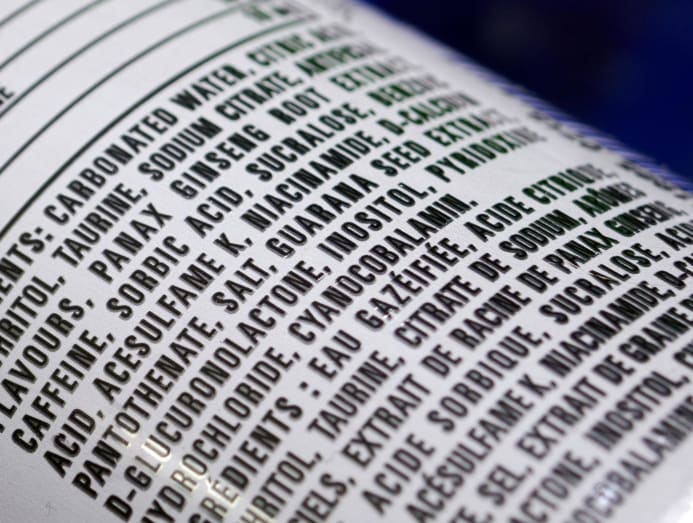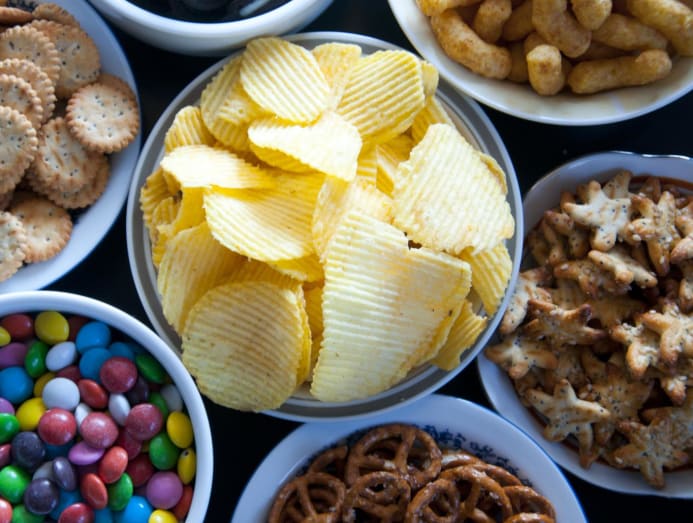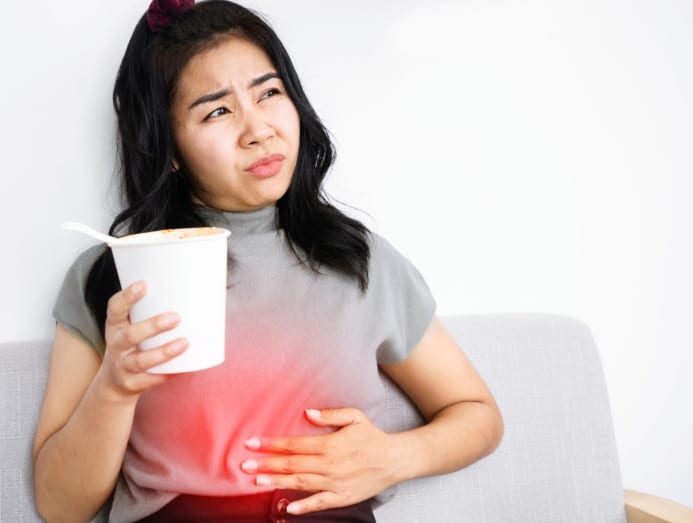How do highly processed foods like instant noodles affect your brain health?
Eating packaged foods has been associated with anxiety, depression and cognitive decline. Scientists are still piecing together why.

(Photo: iStock/Pony Wang)
We’ve known for decades that eating such packaged products – like some breakfast cereals, snack bars, frozen meals and virtually all packaged sweets, among many other things – is linked to unwelcome health outcomes, like an increased risk of diabetes, obesity and even cancer.
But more recent studies point to another major downside to these often delicious, always convenient foods: They appear to have a significant impact on our minds, too.
Research from the past 10 or so years has shown that the more ultraprocessed foods (UPFs) a person eats, the higher the chances that they feel depressed and anxious. A few studies have suggested a link between eating UPFs and increased risk of cognitive decline.
What’s so insidious about these foods, and how can you avoid the mental fallout? Scientists are still working on answers, but here’s what we know so far.

WHAT QUALIFIES AS AN ULTRAPROCESSED FOOD?
In 2009, Brazilian researchers put food on a four-part scale, from unprocessed and minimally processed (like fruits, vegetables, rice and flour) to processed (oils, butter, sugar, dairy products, some canned foods, and smoked meats and fish) and ultraprocessed.
“Ultraprocessed foods include ingredients that are rarely used in homemade recipes such as high-fructose corn syrup, hydrogenated oils, protein isolates and chemical additives” like colours, artificial flavours, sweeteners, emulsifiers and preservatives, said Eurídice Martínez Steele, a researcher in food processing at University of Sao Paulo, Brazil.
This classification system is now used widely by nutrition researchers.
UPFs make up a majority of the packaged foods you find in the frozen food aisles at grocery stores and on the menu at fast-food restaurants – 70 per cent of the packaged foods sold in the United States are considered ultraprocessed. They’re increasingly edging out healthier foods in people’s diets and are widely consumed across socioeconomic groups.
“Ultraprocessed foods are carefully formulated to be so palatable and satisfying that they’re almost addictive,” said Dr Eric Hecht, an epidemiologist at the Schmidt College of Medicine at Florida Atlantic University.
“The problem is that in order to make the products taste better and better, manufacturers make them less and less like real food.”
WHAT EFFECT DO ULTRAPROCESSED FOODS HAVE ON MENTAL HEALTH?
Recent research has demonstrated a link between highly processed foods and low mood. In a 2022 study of over 10,000 adults in the United States, the more UPFs participants ate, the more likely they were to report mild depression or feelings of anxiety.
“There was a significant increase in mentally unhealthy days for those eating 60 per cent or more of their calories from UPFs,” Dr Hecht, the study’s author, said. “This is not proof of causation, but we can say that there seems to be an association.”
New research has also found a connection between high UPF consumption and cognitive decline. A 2022 study that followed nearly 11,000 Brazilian adults over a decade found a correlation between eating UPFs and worse cognitive function (the ability to learn, remember, reason and solve problems).

“While we have a natural decline in these abilities with age, we saw that this decline accelerated by 28 per cent in people, who consume more than 20 per cent of their calories from UPFs,” said Natalia Gomes Goncalves, a professor at the University of Sao Paulo Medical School and the lead author of the study.
It’s possible that eating a healthy diet may offset the detrimental effects of eating UPFs. The Brazilian researchers found that following a healthy eating regimen, like the MIND diet, which is rich in whole grains, green leafy vegetables, legumes, nuts, berries, fish, chicken and olive oil, greatly reduced the dementia risk associated with consuming UPFs.
Those who followed the MIND diet but still ate UPFs “had no association between UPF consumption and cognitive decline,” Dr Goncalves said, adding that researchers still don’t know what a safe quantity of UPFs is.
WHY MIGHT ULTRAPROCESSED FOODS HAVE THIS EFFECT?
It’s unclear. “Many high-quality, randomised studies have shown the beneficial effect of a nutrient-dense diet on depression, but we still do not fully understand the role of food processing on mental health,” said Melissa Lane, a researcher at the Food & Mood Centre at Deakin University in Australia.
However, there are some clues.
Much of the research has focused on how poor gut health might affect the brain. Diets that are high in UPFs are typically low in fibre, which is mostly found in plant-based foods like whole grains, fruits, vegetables, nuts and seeds.
Fibre helps feed the good bacteria in the gut. Fibre is also necessary for the production of short-chain fatty acids, the substances produced when it breaks down in the digestive system, and which play an important role in brain function, said Wolfgang Marx, the president of the International Society for Nutritional Psychiatry Research and a senior research fellow at Deakin University.
“We know that people with depression and other mental disorders have a less diverse composition of gut bacteria and fewer short-chain fatty acids.”

Chemical additives in UPFs might also have an impact on gut flora. “Emerging evidence – mostly from animal studies, but also some human data – suggests that isolated nutrients (like fructose), additives such as artificial sweeteners (like aspartame and saccharin) or emulsifiers (like carboxymethylcellulose and polysorbate-80) can negatively influence the gut microbiome,” Dr Marx said.
Poor gut microbiota diversity as well as a diet high in sugar may contribute to chronic inflammation, which has been linked to a host of mental and physical issues, Dr Lane said. “Interactions between increased inflammation and the brain are thought to drive the development of depression,” she said.
It’s also worth considering the possibility that the link between highly processed foods and mental health works in both directions.
“Diet does influence mood, but the reverse is also true,” said Dr Frank Hu, a professor of nutrition and epidemiology at the Harvard TH Chan School of Public Health. “When you get stressed, anxious or depressed, you tend to eat more unhealthy foods, in particular, ultraprocessed foods that are high in sugar, fat and chemical additives.”

HOW TO RECOGNISE ULTRAPROCESSED FOODS
The best way to identify UPFs is to read product labels. “A long list of ingredients, and especially one that includes ingredients you would never use in home cooking,” are clues that the food is ultraprocessed, said Whitney Linsenmeyer, an assistant professor of nutrition at Saint Louis University in Missouri and a spokeswoman for the Academy of Nutrition and Dietetics.
Chemical names, unpronounceable words, and anything you would be unlikely to find in a kitchen cabinet are often signs that a food is in the ultraprocessed category.
You can still use convenience foods to make cooking easier without resorting to UPFs. Products such as canned beans, frozen vegetables, precooked brown rice or canned fish are all shortcut ingredients that fit well within the scope of a healthy diet, provided there aren’t any industrial items on the ingredient list.
“If the added ingredients are ones you would use yourself, like herbs, spices, salt or cooking oils,” Dr Linsenmeyer said, “that’s an indication that the food, while processed, is not inherently bad for you.”
By Sally Wadyka © The New York Times Company
The article originally appeared in The New York Times.






